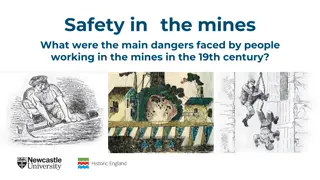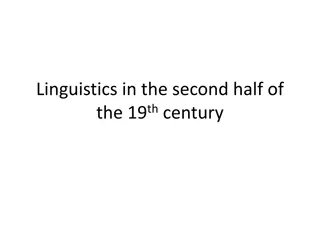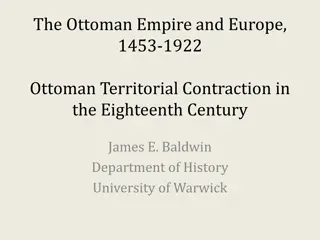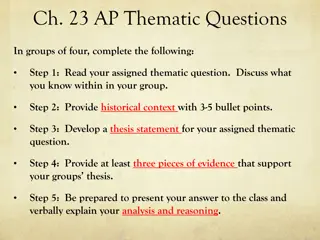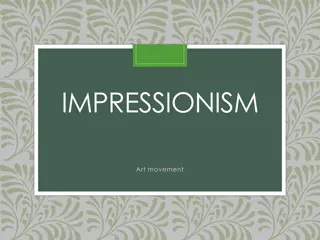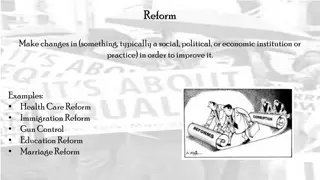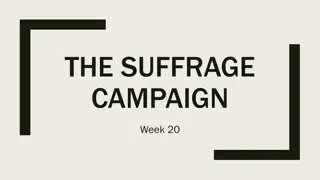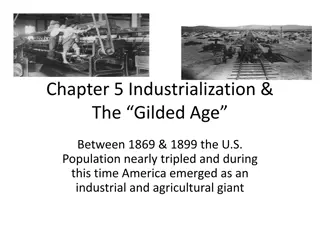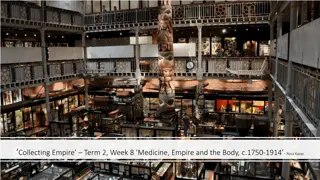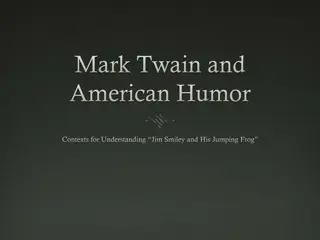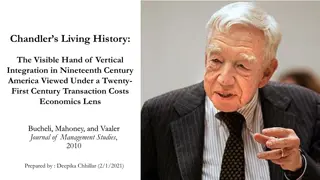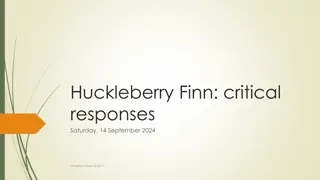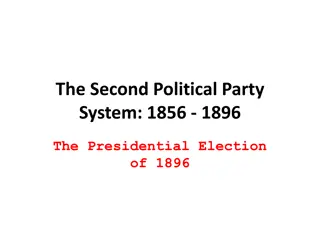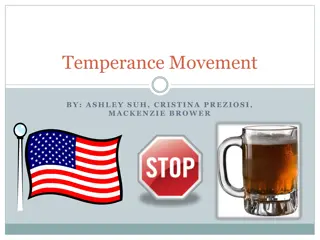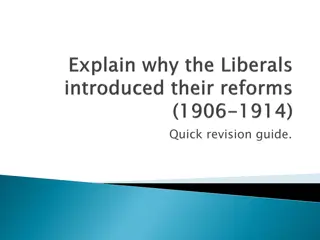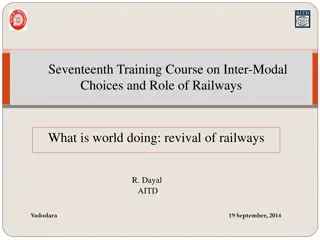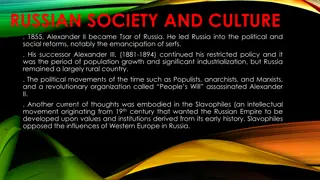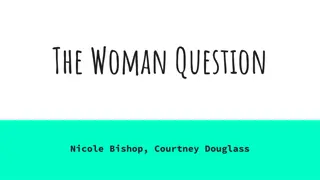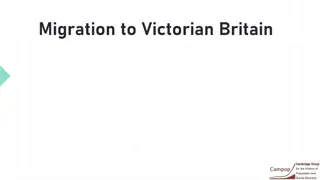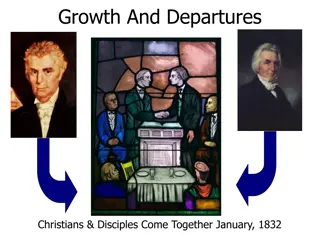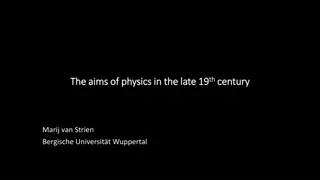Reform Efforts in the Ottoman Empire: 18th and 19th Century Transformations
The Ottoman Empire underwent a series of reforms from the late 18th to the 19th century, aiming to centralize power, boost revenues, strengthen the military, educate bureaucrats, refine legal systems, and improve healthcare. Factors driving these reforms included military weaknesses, separatist nati
0 views • 19 slides
Dangers Faced by Miners in 19th Century Mines
Mines in the 19th century were perilous workplaces with dangers such as flooding, getting trapped, poor ventilation leading to health issues, explosions from fire-damp, and the risk of being crushed. Tragic incidents like the Huskar pit disaster in 1838 and the New Hartley Colliery disaster in 1862
2 views • 9 slides
Linguistics in the Second Half of the 19th Century: Schleicher, Psycholinguistics, Neogrammarian Theories
August Schleicher's biological approach to language, including his Stammbaumtheorie, aligned with Darwinian ideas prevalent in the 19th century. The origins of psycholinguistics can be traced back to Heymann Steinthal, who advanced the psychology of language. This period saw critical developments in
4 views • 22 slides
Ottoman Empire Territorial Contraction in the 18th Century
Ottoman Empire faced agricultural and fiscal crises in the 17th century, leading to internal rebellions. However, by the mid-17th century, the empire had recovered and experienced further expansion, albeit at a slower rate compared to the previous century. In the 18th century, the Ottomans suffered
2 views • 12 slides
Lost and Found: 19th Century Finnish Literature Exploration
Exploring the 19th-century Finnish literature through archives, bibliographies, and digital methods. Efforts to improve metadata, discover new knowledge about authors and works, and reconstruct the literary system disrupted by historical events like the Great Fire of Turku.
1 views • 12 slides
Understanding Civil Society: Concepts, Challenges, and Implications
Explore the dynamics of civil society, from its dense network of groups to its role in democracy. Delve into the typology of Civil Society Organizations, the connection between civil society and democracy, and the unique landscape of civil society in Norway. Engage in thought-provoking discussions o
0 views • 9 slides
Industrialization and Its Impact on Politics and Society in Western Europe
Industrialization spread through Germany and western Europe in the late 19th century, bringing about significant changes to politics and society. Governments implemented reforms to improve workers' lives, consumerism influenced the middle class and working people, and mass political movements aimed
0 views • 23 slides
Understanding Impressionism: Art Movement in the 19th Century
Impressionism emerged in the mid-19th century as a reaction against traditional French art standards. This art movement focused on capturing the essence of a subject through short, thick strokes of paint and vibrant colors applied side-by-side. Artists like Claude Monet, Pierre-Auguste Renoir, and o
0 views • 11 slides
The Impact of Reform Movements on American Society
The Second Great Awakening in the 19th century led to a focus on individual responsibility, personal improvement, and societal change. This religious movement influenced the formation of new denominations, established churches, and sparked social reforms. Additionally, the rise of utopian societies
0 views • 21 slides
The Suffrage Campaign: A Historical Journey Towards Women's Right to Vote
The suffrage campaign traces its origins back to the 19th century, with notable figures like J.S. Mill and Lydia Becker advocating for women's right to vote. The movement saw the formation of official organizations like the London Society for Women's Suffrage and the Manchester Society for Women's S
5 views • 23 slides
The Impact of Industrialization and the Rise of Big Business in the Late 19th Century
The late 19th century saw significant industrial and economic growth in the United States, leading to the emergence of large corporations that dominated the economy and society. The Industrial Revolution spurred the development of interconnected transportation networks, electric power, and the appli
0 views • 21 slides
Evolution of Feminism Through Charlotte Perkins Gilman & Kate Chopin
First Wave Feminism focused on suffrage and legal rights in the 19th century. It later transitioned into the Second Wave critiquing patriarchal structures, with key figures like Betty Friedan and Gloria Steinem. Third-Wave Feminism emerged in the early 1990s addressing workplace harassment and power
6 views • 23 slides
Anthropological Collections and Display Practices in the 19th Century
Explore the practices of collecting and displaying anthropological artifacts in the 19th century, focusing on figures like Pitt Rivers and themes such as craniology, typological organization, and the construction of difference among human groups. The readings provide insights into how museums and ex
0 views • 5 slides
Mark Twain and American Humor: Exploring Southwestern Humor and 19th-century Jokes
Delve into the roots of American humor through the works of Mark Twain, examining Southwestern humor from 1830-1860 characterized by tall tales and dialect humor. Discover the wit of women humorists like Frances Whicher and Marietta Holley. Explore humor forms like anecdotes, hoaxes, and frame tales
0 views • 17 slides
Evolutionary Contributions of Prominent Scientists in the 19th Century
Charles Darwin, Gregor Mendel, Friedrich Miescher, Aristotle, and Carl Linnaeus were key figures in the 19th century who made significant contributions to the fields of evolution, genetics, DNA discovery, and taxonomy. Darwin proposed the theory of evolution and natural selection, Mendel established
0 views • 20 slides
Insights into Vertical Integration in 19th Century America Through Transaction Cost Economics
Exploring Alfred Chandler's work and its application in understanding the evolution of business organizations in the 19th and early 20th centuries in America. The article applies transaction cost theory to explain historical shifts towards vertical integration, emphasizing the cost-efficiency of int
2 views • 16 slides
Supporters of Slavery in the 19th Century: Legal, Religious, and Economic Arguments
In the 19th century, defenders of slavery utilized legal arguments by denying citizenship rights to blacks, religious arguments by justifying ownership and guidance through biblical references, and economic arguments by comparing treatment of slaves in the South to conditions of workers in the North
0 views • 4 slides
Reception and Criticism of "Huckleberry Finn" in the 19th Century
Huckleberry Finn" faced a mix of reception in the 19th century, with some areas praising it while others criticized its language, humor, and moral tone. The book was banned in Concord but gained popularity in other regions, with critics highlighting its depiction of Southern life along the Mississip
0 views • 17 slides
Economic Transformations in Latin America during the Late 19th Century
The late 19th century in Latin America marked a period of significant economic changes driven by a global context that included events like the Great Depression of 1873-1896 and the second industrial revolution. Core capitalist powers sought cheap raw materials, labor, and new markets, leading to in
1 views • 17 slides
European Colonial Encounters 1750-1914: Paths to Imperialism
Second wave European conquests in the 18th and 19th centuries saw a shift towards informal control and military force in establishing empires in Africa and Asia. Various paths to colonial status emerged in India, Indonesia, Australia, and New Zealand, reflecting different colonization methods and ou
0 views • 21 slides
Political Landscape and Elections in the Late 19th Century
The political scene in the late 19th century in the United States was marked by the rise of the Second Party System, leading up to the pivotal Presidential Election of 1896. The Congressional elections of the era reflected shifts in power between Democrats, Republicans, and various opposition groups
0 views • 12 slides
Contrasting Perspectives of America in the 19th Century
The content delves into the societal, economic, and political disparities between the North and South of America in the mid-19th century, highlighting differences in literacy rates, economy, agricultural practices, and labor systems. While the regions shared a common history and political system, th
0 views • 36 slides
Unification of Italy in the 19th Century: Risorgimento Movement
The Unification of Italy in the 19th Century was driven by the Risorgimento nationalist movement, led by figures like Giuseppe Mazzini, Camillo Benso di Cavour, and Giuseppe Garibaldi. Cavour, as Chief Minister of Sardinia, played a crucial role in reorganizing the army and forming alliances to defe
1 views • 25 slides
The Temperance Movement in 19th Century America
The Temperance Movement emerged in the early 19th century in America, advocating for abstinence from alcohol due to its detrimental effects on health, families, and society. Led by figures like Lyman Beecher and Amelia Bloomer, the movement saw a decline in alcohol consumption, the implementation of
0 views • 8 slides
Insights into Italian Foreign Policy and Economy in the 19th Century
This content delves into the history of Italian foreign policy and trading policies between 1860 and 1960, focusing on the perceptions of Italy from abroad, the pre-unitarian inheritance of the Kingdom of Two Sicilies, and the societal and economic landscape of Naples and Sicily during the 19th cent
0 views • 30 slides
Native Americans in the Late 19th Century: APUSH Review
Explore the systematic relocation, conflicts, and cultural assimilation of Native Americans during the late 19th century in America. From the Indian Removal Act to the Dawes Act, witness the impact of government policies on Native tribes, culminating in tragic events like the Sioux Wars and Wounded
0 views • 8 slides
Women and Philanthropy in the 19th Century: A Historical Perspective
This content explores the historiographical trends, gender dynamics, and the role of female philanthropists in the 19th century. It delves into how women engaged in charitable activities, challenging societal norms and contributing to the construction of women's identities through philanthropy. The
0 views • 23 slides
Welfare Reforms in the 19th Century: A Historical Overview
In the 19th century, poverty was often blamed on individuals, leading to a laissez-faire approach by the government. Key figures like Charles Booth and Seebohm Rowntree conducted insightful studies on poverty, highlighting the need for welfare reforms. The emergence of genuine concern for the poor a
0 views • 8 slides
The Evolution and Challenges of Railways in the Modern World
Railways have played a pivotal role in shaping the world's economy, society, and politics since their revolutionary impact in the 19th century. Despite their initial promise, the rail transport sector faces challenges in adapting and growing to meet the demands of modern integrated logistics solutio
0 views • 48 slides
The Second Great Awakening: Revival and Transformation in 19th Century America
The Second Great Awakening was a significant religious movement in 19th century America, marked by fervent revivals led by influential preachers like James McGready and Charles Finney. Emphasizing sin, repentance, and spiritual renewal, this period witnessed a resurgence of evangelical Christianity
0 views • 14 slides
Transformation of Russian Society and Culture in the 19th Century
Alexander II and Alexander III led Russia through political reforms and industrialization, impacting the rural landscape. Various political movements emerged, including Populists, anarchists, and Marxists. The Slavophiles advocated for a return to Russia's historical roots. As Russia transitioned fr
0 views • 14 slides
The Women Question: A Historical Perspective on Gender Rights
The debate on women's rights and roles in society has a rich history dating back to the 19th Century. From the emergence of feminism to the fight for suffrage, women have challenged traditional norms and fought for equality. This narrative explores the evolution of the women's question, highlighting
0 views • 10 slides
Migration Trends in Victorian Britain
Overseas migration to Victorian Britain was relatively low in the 19th and early 20th centuries, with Irish, German, and Italian migrants being prominent. The Irish migration was driven by famine, with many settling in areas like Liverpool for work. German migrants contributed to various professions
0 views • 14 slides
Evolution of State Banking in 19th Century America
American economic development in the 19th century was driven by the abundance of resources and the necessity for capital-intensive projects. The expansion of the economy, adoption of technology, and integration into a national economy required a robust financial system with financial intermediaries
0 views • 19 slides
Historical Evolution of the Christian Church in the 19th Century
In the 19th century, the Christian church underwent significant changes and developments, encompassing growth, unity efforts, leadership transitions, and challenges such as the impact of the Civil War. Key events include the dissemination of the Disciples' Hymn Book, establishment of colleges, the i
0 views • 16 slides
U.S. Expansion and Foreign Policy in the Early 19th Century
The U.S. focused on increasing foreign trade, expanding its borders, and isolating itself from European conflicts during the early 19th century. Key events such as the Louisiana Purchase, annexation of Texas, and treaties with China shaped U.S. foreign policy. Debates over slavery, territorial expan
0 views • 7 slides
Evolution of Thriller Genre: From Crime Retribution to Psychological Imbalance
The history of the thriller genre traces back to the 17th century with themes of crime retribution evolving into entertainment by the 19th century. Crime was viewed as a social problem in the late 20th century, leading to the emergence of detective and criminal noir styles. Psycho thriller narrative
0 views • 6 slides
Evolution of Physics Goals in the Late 19th Century
Physicists in the late 19th century shifted towards modesty regarding the aims of physics, moving away from ontology and truth claims. The ideal of reduction to matter and motion was criticized, and determinism was seen as a regulative principle rather than a proven feature. The concept of descripti
0 views • 35 slides
Wealth Inequality and Property Rights in 19th Century Europe
The concentration of property in 19th-century Europe, particularly in France, saw a rise despite efforts to level wealth distribution post the French Revolution. Wealth inequality remained high throughout the Belle Epoque era, driven by modern financial assets and innovations. This period showcased
0 views • 33 slides
American Religious and Societal Changes in the 19th Century
During the 19th century in America, religious movements like Deism and Unitarianism challenged traditional beliefs, leading to reformations and awakenings. The Second Great Awakening spurred social reforms, while figures like Joseph Smith and Horace Mann influenced education and society. Issues like
0 views • 9 slides

